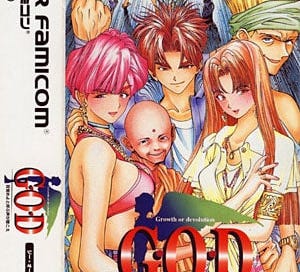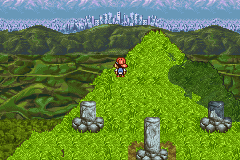G.O.D. (Growth or Devolution), Imagineer's Super Famicom alien invasion
Developer: Imagineer
Publisher: Imagineer
Scenario writer: Shoji Kokami
Composers: Demon Kogure
Character designers: Tatsuya Egawa (Golden Boy)
Genre: Story-driven turn based JRPG
Progression: Completely linear, with plenty of side contents, up until the very last stretch, where getting the true ending without undue frustration is best done with the help of a walkthrough
Developer’s Country: Japan
Platform: Super Famicom
Released: 1996 (Japan)
Completed: Completed on 28\9\2018
In the ‘90s, there were many unlocalized Super Famicom Japanese RPGs that were covered by European videogame magazines, some of which would actually get an English release in North America without having a chance to visit the Old World, but an exponentially larger number were completely ignored because they weren’t heavily featured in Japanese magazines and conventions or were published by, small companies with no Western presence or coverage.
Thus, it wasn’t until the mid ‘00s that I learned about the existance of G.O.D.: Mezame yoto Yobu Koe ga Kikoe - Growth or Devolution for the Super Famicom, possibly while browsing a list of second-hand Super Famicom titles on sale in some Japanese shop. Back then, online resources about the game were little to nothing, with an unfinished walkthrough and some forum posts, but they were still enough to ascertain that G.O.D. had a very unusual and eclectic team behind its development: this 1996 traditional turn-based JRPG, developed and published by Medarot publisher Imagineer, was penned by playwright Shoji Kokami, art-directed by Golden Boy's Tatsuya Egawa and sound-directed by Japanese metal legend Demon Kogure aka Demon Kakka, who I discovered thanks to his delightful performance of King Crimson’s The Court of the Crimson King.
Thankfully, my curiosity was finally sated when Growth or Devolution managed to get an English fan translation in early 2018 thanks to the valiant efforts of Dynamic Designs, the team formed more than a decade ago by the merge of Magical Destiny and Stealth Translations and behind some thirty Super Famicom localizations, while its PS1 remake, G.O.D. Pure, is still unaccounted for.
G.O.D. could be described as a feverishly bizarre and imaginative mix of Earthbound and some traits of Quintet's Soul Blazer pseudo-series, at least before it starts subverting some of its own plot points while taking some pages out of the Megaten playbook later on. The game starts as the young Japanese protagonist, complete with a red cap reminiscent of Ness, decides to visit his grandmother in Hokkaido after finishing his schoolyear and leaves home on his trusty bike. Soon enough, his trip is derailed when he finds a mysterious artifact on a nearby mountain and, just after touching it, is forced to witness an alien fleet destroying his home town. Then, our hero phases out only to awaken ten years later in a military base near Tokyo, where the BLESS group, founded by the United Nations, is organizing some sort of resistance against the alien invaders and the monsters they have unleashed on Japan and the rest of the world.
Thus starts a long, absolutely crazy journey that will see you brave the Japanese seas on a dolphin, visit the Vatican Museum in search of magical artifacts, see the friendly rivalry between British and French reenacted in the remains of the Orient Express, brave post-Soviet bureaucracy and explore Australia with a lemur as your mentor, among plenty of other things like the recurring encounters with a vengeance-driven bat woken from his slumber during the prologue. Oh, and you also get to meet various mythological entities and gradually awaken your mind’s full potential by finding God Stones and mastering your Chakras, while also unveiling Earth’s deepest secrets.
If you're scratching your head at what you've read so far, that's because one of G.O.D.'s talents is the brazen, cheeky way in which it's able to mix wildly different tones and making them seem somewhat coherent, all the while giving the player a straight face and expecting her to fill the gaps. The same could be said of the protagonist's unlikely allies, which are quite funny and outspoken and never take a time out from the game's story event (which is kinda needed, given our hero is mute for most of the game), while also having some nice backstories you get to slowly learn. The game's peculiar atmosphere is further cemented by the fan translation team's editing, which is quite obvious and often goes for a pleasant Dragon Quest-style vibe in heavy-handedly characterizing the various cities and nations through dialects and jokes while also trying to make lots of conversations more entertaining. While I think it's definitely a good fit for G.O.D., especially considering it’s indeed set on Earth, fans of more literal translations could have some issue with this approach.

G.O.D. is also quite a big game: at first, your world map will be a simplified Japan you will explore while familiarizing with the alien menace and finding the hero's allies, and you could well be excused if you thought that was it, given you will spend quite a bit of time there. Then, the game literally opens up and old Japan becomes just a small dot on the real world map, which you will get to explore for the rest of the game. With its large amount of story locations and quite a bit of optional and secret areas (island paradises, infested meteor crash sites, Antarctic bases or the seat of the Bun King, just to name a few), G.O.D. will likely take more than 50 hours to see the ending credits. Thankfully, backtracking ends up being very limited, and the game's frantic pacing and flurry of new locations is a refreshing change of pace compared to some contemporary JRPGs.
Despite its age, G.O.D. is also quite friendly towards less patient players: grinding is really unimportant until the final battle, most dungeons are either short, simple or both and random encounters are rarely deadly, with bosses still posing a challenge without being particularly cruel. Battles are presented in a way reminiscent of Phantasy Star IV or Lufia, with the characters facing the enemy, while the turn structure has each hero or enemy act depending on her speed, with all the usual tactical consequences this kind of choice entails (there’s even a passive skill that lets you game the turn order a bit).
Aside from the usual levelling and equipments, the characters have a lot of other options: psychic powers act like spells and are learned while gaining new levels, while skills are unlocked by reaching story milestones or talking with NPCs after some particular event, and are often optional and hard to find. Then you have Chakras, the most exciting and unique part of G.O.D.'s customization system: each character can decide to channel the Cosmo Stones obtained after each battle towards the development of one among many Chakras, all linked to different abilities. Levelling up the Chakras, though, also depends on how many God Stones you've found, with each of the seven Stone adding up a 10% to the characters' mental acuity and increasing each Chakra's max level cap by one. After the fourth level is unlocked, you can link two different Chakras in order to get some interesting combo passive skills.

Ironically, G.O.D.’s main flaws are actually linked to its whimsical craziness: fort those searching for a challenging game, a deeper focus on dungeon crawling or for a more focused and serious narrative, chances are this game could end up being far less interesting. Also, Growth or Devolution’s huge volume isn’t matched by its budget and, while G.O.D. is far from the worst Super Famicom JRPGs as far as graphics go, it’s also mostly unimpressive in that regard, sometimes also due to tilesets that feel a bit out of place for the locations and time period they’re trying to portray, like with the United Nations building feeling almost like an old mansion. From a narrative standpoint, in some instances it feels like the story is more interested in piling in yet another plot twist or secret, rather than in coherently organizing the ones introduced before, which does harm the setting’s potential a bit while also creating some potential inconsistencies and plot holes, especially concerning the details of the alien menace.
Still, for those who aren’t against experiencing a JRPGistic fever dream once in a while, G.O.D. is a lovingly crafted title whose bizarre mix of wildly different tropes and tones, paradoxically, ends up showing a remarkably unified vision, and the courage to build upon it with a full fledged game that can stand on its own even in a lineup as crowded as the Super Famicom one.
*A previous version of this article was published by yours truly on the r/JRPG subreddit on 29\9\2018.







